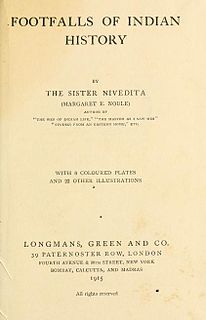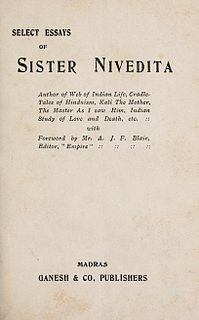
Krishna is a major deity in Hinduism. He is worshipped as the eighth avatar of the god Vishnu and also as the supreme God in his own right. He is the god of compassion, tenderness, and love in Hinduism, and is one of the most popular and widely revered among Indian divinities. Krishna's birthday is celebrated every year by Hindus on Krishna Janmashtami according to the lunisolar Hindu calendar, which falls in late August or early September of the Gregorian calendar. Krishna is usually depicted with a flute in his hand. The current tradition of the monotheistic cult of Krishna, is the result of the amalgamation of several ancient traditions, particularly the originally independent cults of Vāsudeva-Krishna, Gopala-Krishna and Bala-Krishna, as well as Bhagavatism.

Lakshmi is an ancient Indian goddess of prosperity, good fortune, and beauty, first mentioned in the Śrī Sūkta of the Rigveda. Sri, a honorific term for Lakshmi, represents the material world of the earthly realm as the mother goddess, referred to as Prithvi Mata, and known by her twin identities as Bhu Devi, and Sri Devi. She is the wife of Vishnu, one of the principal deities of Hinduism and the Supreme Being in the Vaishnavism Tradition. With Parvati and Saraswati, she forms Tridevi, the holy trinity. Lakshmi is also an important deity in Jainism and found in Jain temples. Lakshmi has also been a goddess of abundance and fortune for Buddhists, and was represented on the oldest surviving stupas and cave temples of Buddhism. In Buddhist sects of Tibet, Nepal and Southeast Asia, goddess Vasudhara mirrors the characteristics and attributes of the Hindu goddess Lakshmi with minor iconographic differences.

The Nāṭya Śāstra is a Sanskrit text on the performing arts. The text is attributed to sage Bharata Muni, and its first complete compilation is dated to between 200 BCE and 200 CE, but estimates vary between 500 BCE and 500 CE.

Sister Nivedita was an Irish teacher, author, social activist, school founder and disciple of Swami Vivekananda. She spent her childhood and early youth in Ireland. From her father, a college professor, she learned the ideal of service to mankind as the true service to God. She worked as a school teacher and later also opened a school. She was engaged to marry a Welsh youth, but he died soon after their engagement. Sister Nivedita met Swami Vivekananda in 1895 in London and travelled to Calcutta, India in 1898. Swami Vivekananda gave her the name Nivedita when he initiated her into the vow of Brahmacharya on 25 March 1898. In November 1898, she opened a girls' school in the Bagbazar area of Calcutta. She wanted to educate girls who were deprived of even basic education. During the plague epidemic in Calcutta in 1899, Nivedita nursed and took care of the poor patients. Nivedita had close associations with the newly established Ramakrishna Mission. Because of her active contribution in the field of Indian Nationalism, she had to publicly dissociate herself from the activities of the Ramakrishna Mission under the then president Swami Brahmananda. She was very close to Sarada Devi, the spiritual consort of Ramakrishna and one of the major influences behind Ramakrishna Mission, and also with all brother disciples of Swami Vivekananda. She died on 13 October 1911 in Darjeeling. Her epitaph reads, "Here lies Sister Nivedita who gave her all to India".

The Algebra of Infinite Justice (2001) is a collection of essays written by Booker Prize winner Arundhati Roy. The book discusses several perspectives of global and local concerns, among them one being the abuse of Nuclear bomb showoffs.
Atheism and agnosticism have a long history in India and flourished within the Sramana movement. Indian religions like Jainism, Buddhism and most schools of Hinduism consider atheism to be acceptable. India has produced some notable atheist politicians and social reformers. According to 2011 Census of India, 99.76% of Indians identified with a religion while 0.24% did not state their religious identity. According to the 2012 WIN-Gallup Global Index of Religion and Atheism report, 81% of Indians were religious, 13% were non-religious, 3% were convinced atheists, and 3% were unsure or did not respond.

The Master as I Saw Him: Being pages of the life of the Swami Vivekananda is a 1910 book written by Sister Nivedita. The book covers Nivedita's experiences with Swami Vivekananda, whom she met in London during November 1895. The book was simultaneously published from England and India, and The Master as I Saw Him is now considered to be a classic text.

Bhagini Nivedita is a 1962 Bengali film directed by Bijoy Basu. The story was based on the life of Sister Nivedita. It won a national film award in best films category and a presidential medal.

Kali the Mother (1900) is an English book written by Sister Nivedita. Kali is a popular Hindu goddess who is considered to free her worshippers from fear (anxiety) and all troubles. In this book Nivedita celebrated this Indian goddess Kali.

Cradle Tales of Hinduism (1907) is a collection of stories by Sister Nivedita. It is an introduction to Hindu mythology; the stories come from the Mahabharata, the Ramayana and other Hindu sources and are presented as they were told in Indian nurseries.

Footfalls of Indian History (1915) is a book written by Sister Nivedita. Nivedita dedicated her life for the service of India. In the book the author has discussed on several chapters of Indian history about its glory and drawbacks. The most important topics of Indian history like religions of India, Indian philosophy, Indian culture, and Indian architecture have been discussed in the book. Nivedita not only discussed some problems in India, she also suggested ways to solve some of those problems.

An Indian Study of Love and Death (1908) is a book written by Sister Nivedita.

Myths of the Hindus & Buddhists (1913) is a book written by Sister Nivedita and Ananda K. Coomaraswamy.

Religion and Dharma (1915) is a book written by Sister Nivedita. In this book Nivedita has discussed on the common principles of individual and social growth according to the law of Dharma.

Studies from an Eastern Home (1913) is an autobiographical book written by Sister Nivedita.

Notes of Some Wanderings with the Swami Vivekananda (1913) is an English language book written by Sister Nivedita. In this book Nivedita has narrated the experiences she had while traveling with Swami Vivekananda in different parts of India.

Select Essays of Sister Nivedita (1911) is an English-language book written by Sister Nivedita, a disciple of Swami Vivekananda. The foreword of the book was written by A. J. F. Blair.
Sankari Prasad Basu is an Indian scholar, writer and critic who writes mainly in the Bengali language. He is a researcher on Swami Vivekananda and his books on the subject include Sahashya Vivekananda and Bandhu Vivekananda. One of his notable publications is his seven-volume research work Vivekananda o Samakalin Bharatbarsha, for which he won the prestigious Sahitya Akademi Award in 1978.

Bartaman Bharat is a Bengali language essay written by Indian Hindu monk Swami Vivekananda. The essay was first published in the March 1899 issue of Udbodhan, the only Bengali language magazine of Ramakrishna Math and Ramakrishna Mission. The essay was published as a book in 1905 and later it was compiled into the fourth volume of The Complete Works of Swami Vivekananda.


















